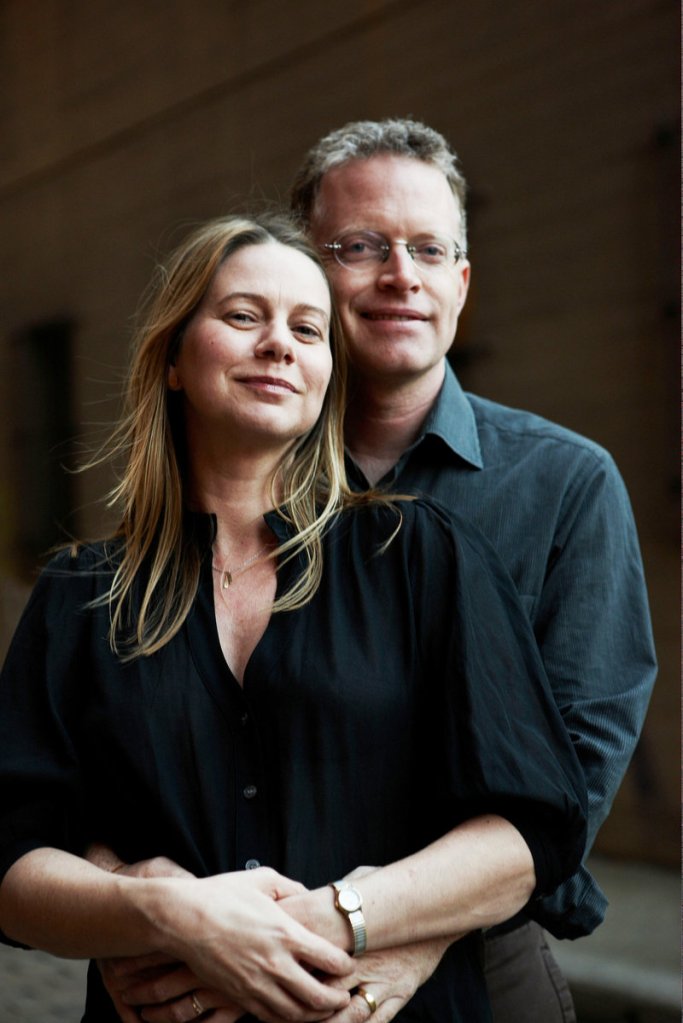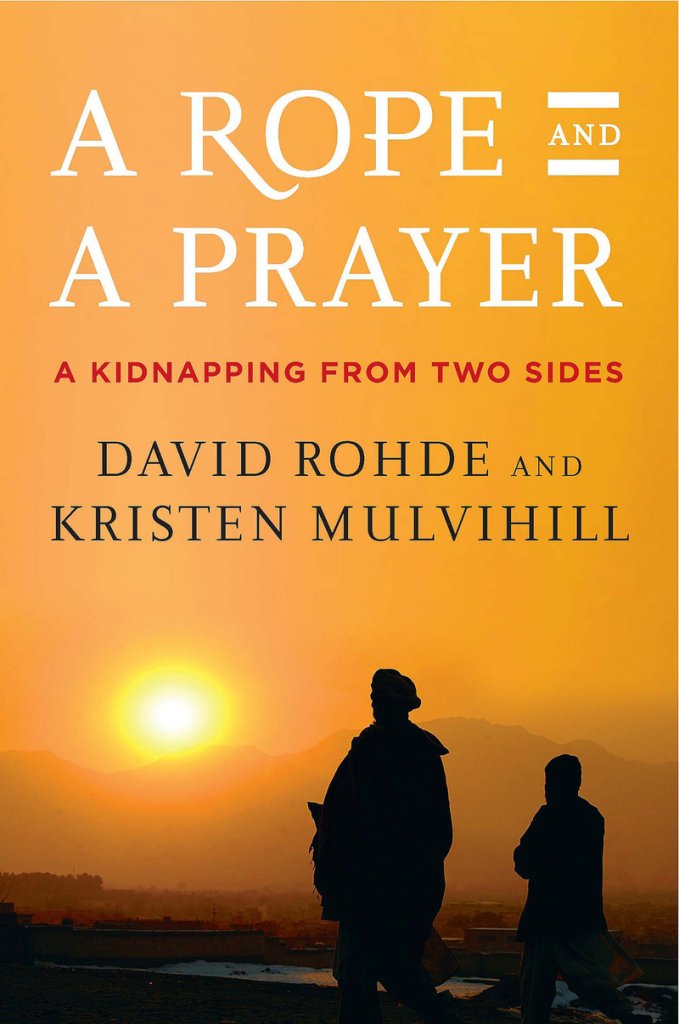When David Rohde despaired most, he allowed himself to think about the happiest times of his life.
The American journalist, held captive by the Taliban in the remote mountains of Pakistan from November 2008 to June 2009, wanted his kidnappers to know that their image of America was wrong. To illustrate his point, he told them stories about coming of age in western Maine.
“They had this view of all Westerners as hedonists who were just sort of, I don’t know, focused on the pleasures of this world,” Rohde said by phone. “I told them I was from this small town where people didn’t put on airs. I tried to describe what America was really like, and I used Fryeburg as an example.”
Rohde, a New York Times reporter who graduated from Fryeburg Academy in 1985 and attended Bates College in Lewiston, has co-written a book about his experience, “A Rope and a Prayer: A Kidnapping from Two Sides.”
His co-author is his wife, Kristen Mulvihill. He writes about his kidnapping from the point of impact. She writes about it as a spouse, telling how she managed it from her end.
Both have deep roots in Maine. Rohde moved to Maine when he was 14, and his father still lives here, as do two of his aunts. Mulvihill’s parents live in the Kennebunks. Rohde and Mulvihill got married in Biddeford Pool in September 2008.
Rohde, a Pulitzer Prize-winning journalist, called his years in Fryeburg “the happiest times of my life. I made some of my best friends at Fryeburg, and a whole bunch of families there welcomed me.”
The couple, who live in New York, are now on a book tour promoting “A Rope and a Prayer.” The tour won’t bring them to Maine, but they spoke to The Portland Press Herald by phone this week.
They decided to write the book together because each of them offers a different perspective on the same set of events. After Rohde described his ordeal in a long series in The New York Times, Mulvihill said, she was approached by a women’s magazine to write about the kidnapping from the spouse’s perspective.
Writing a book as a tandem seemed to make sense.
Rohde describes the details of his capture and his months among the Taliban, being whisked from one outpost to another while ducking American drone missile attacks.
She writes about the negotiations to free him, and how she coped with the silence. The kidnapping was kept quiet, even in the pages of the Times.
Rohde’s negotiating team, including his wife, the newspaper’s editor and contractors who were hired to expedite the process, agreed that it would be best if the kidnapping remained out of the news as long as possible.
Such a decision “goes against every instinct of a journalist,” Rohde said, but he believes such respect should be accorded to all people who are kidnapped because it improves the chances of a positive outcome, particularly when the hostage-takers are militants who want to defy public opinion in the West.
“Publicity leads them to increase their expectations,” he said.
A colleague at the Times monitored Rohde’s Wikipedia page to ensure that no mention of his capture made it onto the website.
The family asked a newspaper in southern Maine to remove the couple’s wedding announcement from its website. The wedding occurred two months before the kidnapping, and Rohde knew that his captors were Googling his name for information. The wedding announcement included Mulvihill’s name, and Rohde wanted to protect her family.
Mulvihill fielded phone calls in New York directly from the Taliban. She was told to write down the number on her caller ID and call back, because, she said, “they did not have enough money on their calling cards.”
To secure his release, Rohde’s captors insisted on $25 million in ransom and the exchange of 15 prisoners from Guantanamo Bay. Later, those demands were reduced to $8 million and four prisoners.
“But the negotiations never went anywhere,” Mulvihill said. “The demands were too steep.”
She and her husband spoke twice. The phone calls sustained them, and helped them feel connected.
“I tried to stay really calm when I was on the phone with David. I didn’t know if it would be the last time we talked, or the last time he heard my voice,” Mulvihill said.
“In whatever Red Cross letters that Kristen wrote, she said, ‘You must be strong because I am strong.’ That really kept me going,” Rohde said. “When we talked on the phone, her voice felt incredibly calm. My job was to get through the days and months, because I knew that she and my family were doing everything they could to help.”
Ultimately, Rohde said, he turned to religion to sustain his hope.
“I am very skeptical of organized religion, but I did develop a set of prayers that I said each day in captivity. It was something I could do that the guards could never take away from me. It centered me and calmed me to say them each day,” he said.
Rohde escaped in June 2009, with help from moderate Afghans and Pakistanis.
The book, released in late November, has received a lot of attention. It’s a riveting account of the couple’s experience, and it includes Rohde’s analysis of the threat posed by the Taliban, the duplicity of American allies in the region and the cost of the war in Afghanistan.
His captors trained suicide bombers and plotted attacks against the West. The would-be Times Square bomber, Faisal Shahzad, was trained in the same part of Pakistan’s tribal area where Rohde was held.
Remarkably, Rohde’s kidnapping was his second capture. He covered the ethnic cleansing and genocide of the Muslim population in eastern Bosnia. He was the first outside eyewitness to the aftermath of the Srebrenica massacre, and reported his observations of human bones, Muslim prayer beads, shell casings and mass graves.
Bosnian Serb authorities detained him soon after he filed his reports. He was held captive for 10 days and charged with various crimes. He eventually was pardoned after considerable pressure from the U.S. government and international negotiators.
After his release, he testified before Congress about what he had seen. He won numerous awards for his work in Eastern Europe, including a Pulitzer.
Rohde and Mulvihill hope their memoir tells not only their personal story, but also what Rohde calls “the international tragedy of America’s involvement in Afghanistan and Pakistan.”
Back home, Rohde said, his days as a war correspondent are over. “I am back to being an investigative reporter — no more reporting in war zones.”
Staff Writer Bob Keyes can be reached at 791-6457 or at:
bkeyes@pressherald.com
Follow him on Twitter at:
twitter.com/pphbkeyes
Send questions/comments to the editors.





Success. Please wait for the page to reload. If the page does not reload within 5 seconds, please refresh the page.
Enter your email and password to access comments.
Hi, to comment on stories you must . This profile is in addition to your subscription and website login.
Already have a commenting profile? .
Invalid username/password.
Please check your email to confirm and complete your registration.
Only subscribers are eligible to post comments. Please subscribe or login first for digital access. Here’s why.
Use the form below to reset your password. When you've submitted your account email, we will send an email with a reset code.